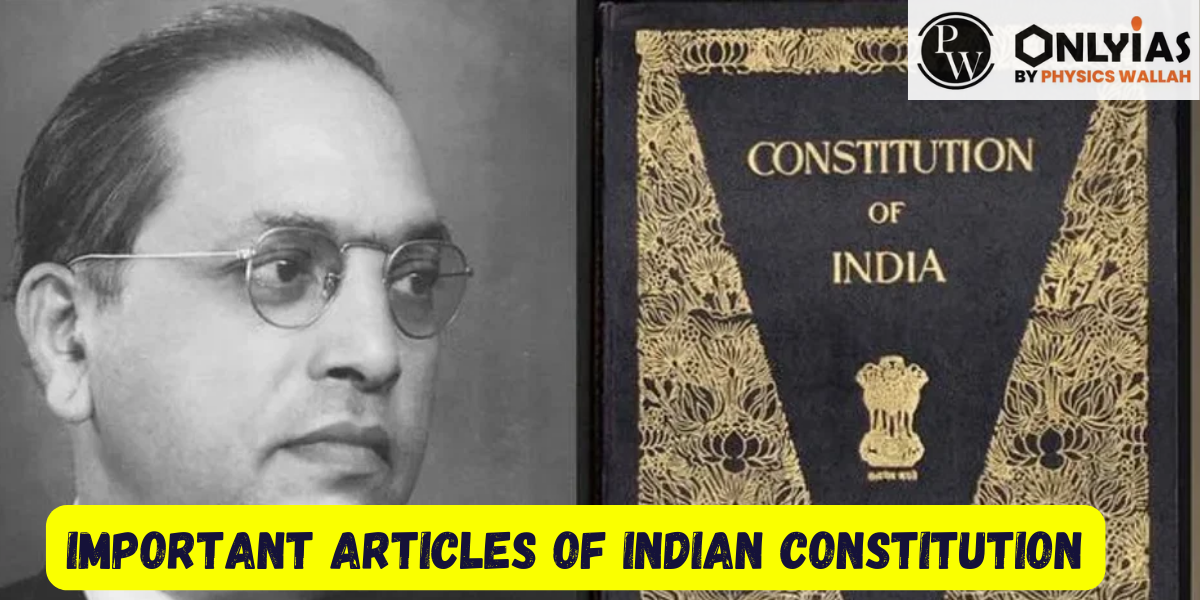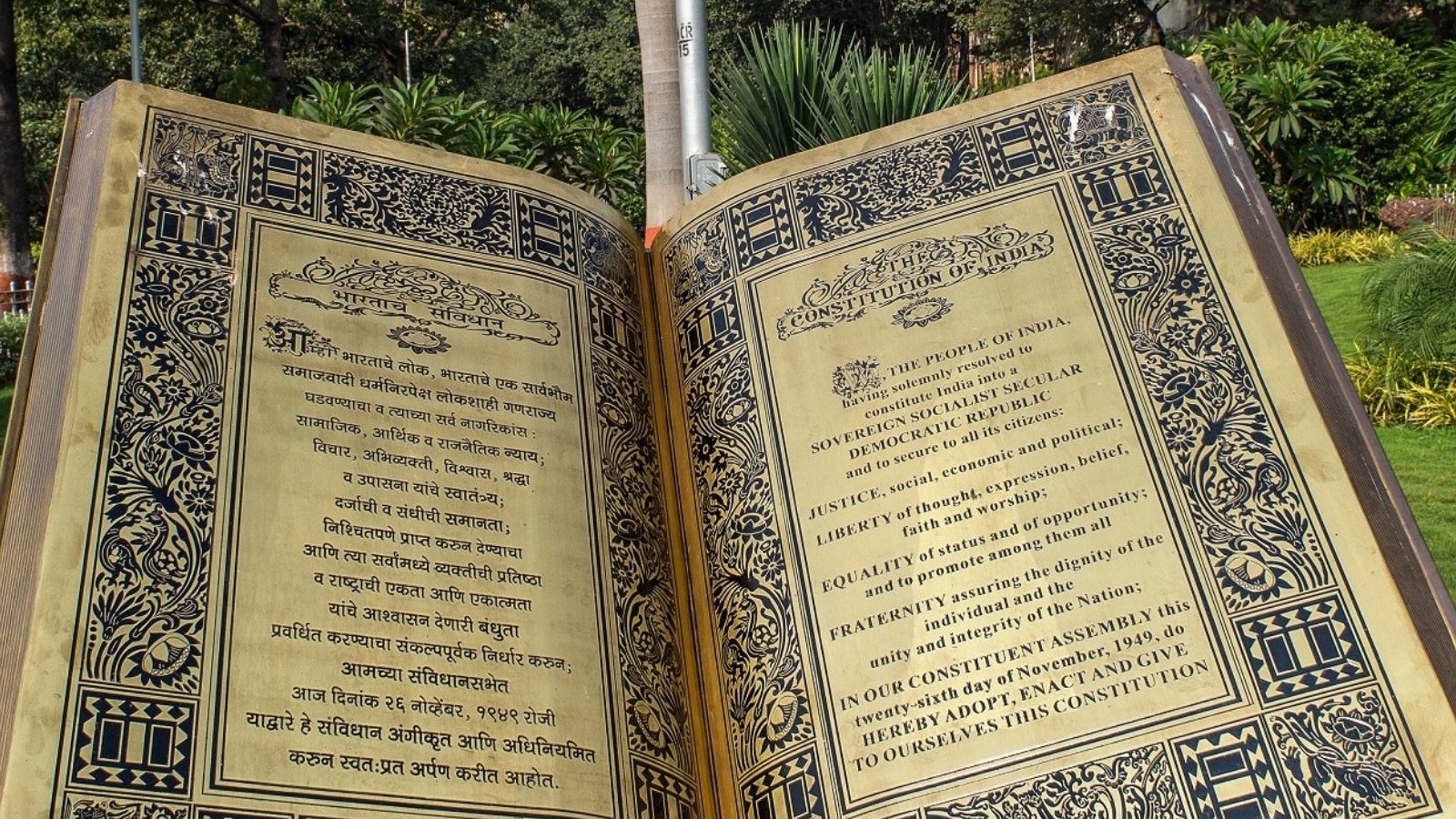
The Constitution of India, adopted on January 26, 1950, is the supreme law of the land, serving as the guiding light of the nation. It represents the collective vision of the founding fathers, seeking to create a sovereign, socialist, secular, and democratic republic. The Indian Constitution is an elaborate document that defines the framework and principles governing the country’s governance.
Within its pages, several articles stand out as fundamental pillars, shaping the very essence of India’s democracy and society. In this article, we will explore some of the most important articles of Indian Constitution that play a vital role in upholding the nation’s democratic ideals and values.

The Indian Constitution, adopted on January 26, 1950, is the supreme law of India, providing the framework for its governance and functioning as a guiding light for the nation’s progress. It is a meticulously crafted document that reflects the collective wisdom and aspirations of the people. Envisioned as the cornerstone of India’s democratic and secular fabric, the Constitution lays down the fundamental principles that govern the country’s political, social, and economic structures.
With its comprehensive nature, the Indian Constitution encompasses a wide array of elements that define the rights, responsibilities, and powers of the various entities within the nation. From fundamental rights and directive principles to the organization and functioning of the government, each part of the Constitution serves a distinct purpose in shaping the nation’s identity and upholding the values of justice, liberty, equality, and fraternity.
We will explore the pivotal parts of the Important Articles of Indian Constitution and their significance in shaping the destiny of the world’s largest democracy.
Below is the list of Parts of the Important Articles of Indian Constitution:
List of Parts of Important Articles of Indian Constitution |
||
| PART | Part Name | Articles |
| Part I | Union & Its Territory | Article 1-4 |
| Part II | Citizenship | Article 5-11 |
| Part III | Fundamental Rights | Article 12-35 |
| Part IV | Directive Principles | Article 36-51 |
| Part IV A | Fundamental Duties | Article 51A |
| Part V | The Union | Article 52-151 |
| Part VI | The States | Article 152-237 |
| Part VII | Part 7 Repealed by 7th Amendment Act, 1956 | — |
| Part VIII | The Union Territories | Article 239-242 |
| Part IX | The Panchayats | Article 243-243O |
| Part IX A | The Municipalities | Article 243P-243ZG |
| Part IX B | Co-operative Societies | Article 243ZH-243ZT |
| Part X | Scheduled and Tribal Areas | Article 244-244A |
| Part XI | Relation between Union & States | Article 245-263 |
| Part XII | Finance, Property, Contracts and Suits | Article 264-300A |
| Part XIII | Trade, Commerce and Intercourse within the territory of India | Article 301-307 |
| Part XIV | Services under the Union and States | Article 308-323 |
| Part XIV A | Tribunals | Article 323A-323B |
| Part XV | Elections | Article 324-329A |
| Part XVI | Special Provisions relating to certain classes | Article 330-342 |
| Part XVII | Official Languages | Article 343-351 |
| Part XVIII | Emergency Provisions | Article 352-360 |
| Part XIX | Miscellaneous | Article 361-367 |
| Part XX | Amendment of the Constitution | Article 368 |
| Part XXI | Temporary, Transitional and Special Provisions | Article 369-392 |
| Part XXII | Short title, Commencement, Authoritative Text in Hindi and Repeals | Article 393-395 |

Before seeing the Important Articles of Indian Constitution, we need to have a look at the Preamble to the Constitution of India. The Preamble to the Indian Constitution is a brief introductory statement that outlines the fundamental values and objectives of the Constitution. It serves as the guiding spirit and the soul of the Constitution. The Preamble was adopted on 26th November 1949 and was enacted along with the rest of the Constitution on 26th January 1950, when India became a republic. The Preamble reads as follows:
Tip:
“We, the people of India, having solemnly resolved to constitute India into a Sovereign Socialist Secular Democratic Republic and to secure to all its citizens:
Justice, social, economic and political; Liberty of thought, expression, belief, faith and worship; Equality of status and opportunity; and to promote among them all Fraternity, assuring the dignity of the individual and the unity and integrity of the Nation;
In our constituent assembly, this twenty-sixth day of November 1949, do hereby adopt, enact and give to ourselves this Constitution.”
The key principles enshrined in the Preamble are:
The Preamble reflects the aspirations and goals of the people of India, and it serves as a guiding principle for the interpretation of the Constitution and the governance of the country. Now, we can proceed to seeing the Important Articles of Indian Constitution.
The Indian Constitution, a comprehensive and dynamic document, serves as the guiding framework for the world’s largest democracy. Enacted on January 26, 1950, it comprises a series of essential articles that lay the foundation for India’s governance and uphold citizens’ rights and responsibilities. Here’s a curated list of Important Articles of Indian Constitution, that shape the nation’s legal and political landscape:
In the Indian Constitution, DPSP stands for Directive Principles of State Policy. These are a set of guidelines or principles laid down in Part IV (Articles 36 to 51) of the Constitution that the State is expected to follow while making laws and policies. Unlike fundamental rights, DPSPs are not enforceable by the courts, but they serve as a moral and political obligation for the government to promote social justice, equality, and better standards of living for the people of India. The DPSPs aim to establish a welfare state and provide social and economic justice to all citizens.
Here are the relevant articles related to Directive Principles of State Policy in the Indian Constitution:
The Fundamental Duties are enshrined in Part IV-A of the Indian Constitution, specifically in Article 51A. These duties were added by the 42nd Amendment Act of 1976, inspired by the Constitution of the former USSR. They were incorporated to emphasize the importance of citizen participation in building a strong and responsible nation. As of my last update in September 2021, there are 11 Fundamental Duties outlined in Article 51A. Here they are:
The Indian Constitution, one of the world’s lengthiest and most comprehensive, enshrines various articles that are crucial for the functioning of the Union government. Among these, Article 1 holds paramount importance as it defines India’s territory, stating that India shall be a Union of States and includes the territories specified in the First Schedule. Article 52 establishes the President of India as the head of the Union, embodying the nation’s sovereignty and symbolizing unity.
Article 75 outlines the Council of Ministers, with the Prime Minister at its helm, responsible for aiding and advising the President in the exercise of his or her functions. Furthermore, Article 246 delineates the distribution of legislative powers between the Union and the States, serving as a foundation for the division of responsibilities and functions to maintain federal unity. These articles, along with others, lay the framework for the Union government’s functioning and its relationship with the states in India’s federal structure.
Below is the List of Important Articles of Indian Constitution related to the Union:
Part VI of the Indian Constitution (Articles 152 to 237) deals specifically with the States and the Union territories. Here are some key aspects related to the States in the Indian Constitution:
Below is the List of Important Articles of Indian Constitution related to the States:
In the Indian Constitution, emergency provisions are enshrined in Part XVIII (Articles 352 to 360) to deal with exceptional situations that threaten the security, integrity, or stability of the country. There are three Important Articles of Indian Constitution related to emergencies mentioned in the Indian Constitution:
This emergency can be declared when the security of India is threatened by war, external aggression, or armed rebellion. It empowers the President to declare a state of emergency throughout the country or a specific part of it. Some important aspects of Article 352 include:
Also known as President’s Rule, this emergency can be declared when there is a breakdown of constitutional machinery in a state. It grants the President the authority to assume the functions of the state government and place it under the direct control of the central government. Important points about Article 356 are:
This emergency can be declared when the financial stability or credit of India or any part of its territory is threatened. It grants the President the power to issue directions to the states for financial consolidation. Key points regarding Article 360 are:

Ques: Which is one of the most important articles of Indian Constitution?
Ans: The Indian Constitution is a comprehensive document with several important articles that form the backbone of the country’s governance. While all articles are crucial in their own right, there is often debate about which one can be considered the most important. Different scholars and experts may have varying opinions on this matter. However, many people regard Article 21 as one of the most significant and fundamental provisions in the Indian Constitution.
Ques: How many important articles of Indian Constitution are there?
Ans: The Indian Constitution consists of 395 articles. These articles cover various aspects of governance, fundamental rights, directive principles of state policy, the structure of the government, and other important provisions that form the basis of India’s legal framework.
Ques: भारतीय संविधान में कितने अनुच्छेद महत्वपूर्ण हैं?
Ans: भारतीय संविधान में 395 अनुच्छेद होते हैं। ये अनुच्छेद सरकार चलाने के विभिन्न पहलुओं, मौलिक अधिकारों, राज्य नीति के निर्देशक सिद्धांतों, सरकार के संरचना, और भारत के कानूनी ढांचे के आधार बनाने वाले अन्य महत्वपूर्ण प्रावधानों को कवर करते हैं।
Ques: What is the Article 343 to 351?
Ans: Part 17 of the Indian constitution (comprising Articles 343 to 351) contains detailed provisions concerning the official language of the Republic of India. The primary focus on the official language of the Union is encompassed in Articles 343 and 344 of the Indian Constitution.
Jawaharlal Nehru Biography, Education, Wife, Books, Death, History
Important Awards In India List 2023, History and Significance
<div class="new-fform">
</div>